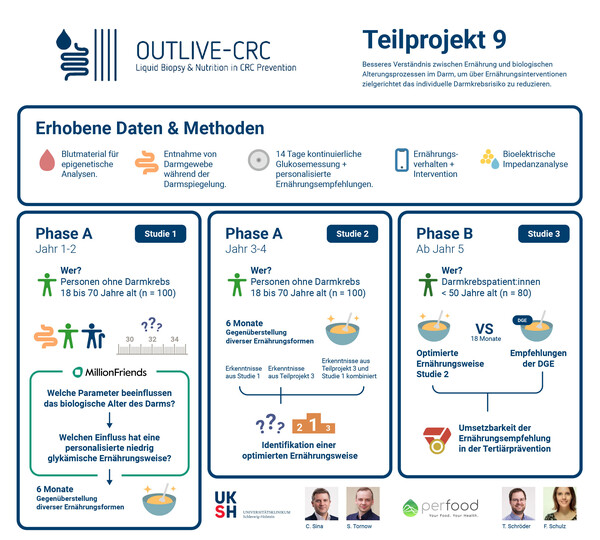Subproject (9) - Implementation of personalized nutrition interventions
Project lead
Prof. Dr. med. Christian Sina, Institut für Ernährungsmedizin (IEM), UKSH
Dominik Burziwoda, Perfood GmbH
Project description
The overall goal of P9 is to better understand the relationship between nutrition and biological aging processes in the intestine. In the future, this knowledge should make it possible to reduce the individual risk of colorectal cancer as specifically as possible through nutritional interventions.
To this end, the project was divided into two phases:
- Phase A (years 1 and 2) of the project is based on the assumption that our diet has a significant influence on aging processes in the gut.
- In a first step, we will therefore investigate the correlation of our nutritional behavior with molecular biology-relevant measurements of intestinal aging. For this purpose, the test persons will participate in a 14-day app-based test phase, during which the glucose level in the subcutaneous adipose tissue will be measured continuously (continuous glucose monitoring - CGM). This allows us to draw conclusions about the subjects' individual glucose response to selected foods. In addition, subjects will be asked to record their dietary behavior over 6 months in an app. This dietary monitoring will be complemented by metabolic analyses to determine a metabolic phenotype. According to our hypothesis, it will be possible to attribute this metabolic phenotype (metabotype) together with the dietary habits (nutritype) to defined biological aging processes in the intestine. The intestinal tissue required for this will be obtained from the test persons in the course of two colonoscopies and will be further investigated in the course of the other subprojects of OUTLIVE.
- In part 2 of phase A (years 3 and 4), we will plan an intervention study based on the results of phase A, in which particularly promising forms of nutrition will be tested with regard to their influence on intestinal aging processes. The goal is to define an optimized diet.
- In phase B (year 5 to 7) a clinical evaluation and integration of this "optimized diet" into a tertiary prevention program for colorectal cancer (CRC) patients will be performed.
- The nutritional intervention best tested in phase A will subsequently be investigated in CRC patients in the context of tertiary prevention. In addition to clinical efficacy, the focus will be on the user-friendliness of the planned nutritional recommendations and the app. For this purpose, 80 patients will be included in an explorative study protocol, which will be investigated over a period of 18 months to determine whether the results from phase A of the project can be transferred to CRC patients.






